Internationally unique book published about audiovisual manipulation
NMHH has published a book about the deepfake phenomenon
How frightening is the advancement of AI, specifically deepfakes, for a cybersecurity researcher on a scale of 1 to 10? Does the legal regulation of deepfakes restrict the freedom of speech? How can digital media consciousness that protects against deception be taught? On 16 October 2023, on the premiere of the volume of studies titled Deepfake: Unreal reality (Deepfake: A valótlan valóság) the participants got these questions answered, among others. This uniquely themed book was published by the Media Council of the NMHH, produced by Gondolat Kiadó.
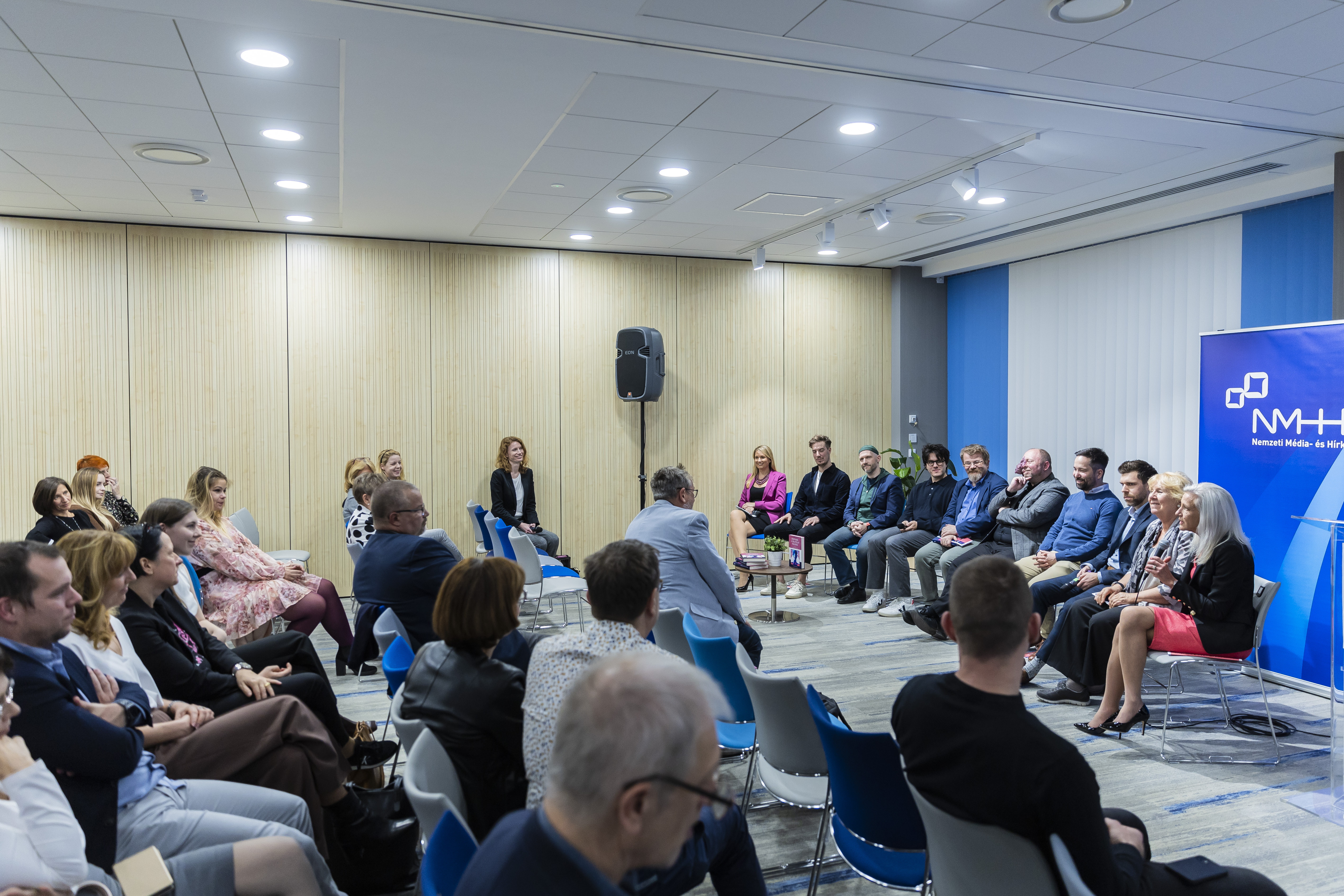
Deepfake: Unreal reality was edited by Petra Aczél and Ágnes Veszelszki, and it includes 14 studies from the author, collated by the aspects of communication and media sciences, cybersecurity, media rights, and psychology-pedagogy. The topic of the book is also internationally unique: NMHH and Gondolat Kiadó were the first to produce a book specifically about audiovisual manipulation. “Deepfake is the impostor of our age. A piece of content, image, message – the work of a quick learning Artificial Intelligence striving to create a media event that’s deceptively realistic but never happened.” – the synopsis of the book reads.
The non-traditional book premiere was opened by Károly Szadai, a member of the Media Council, then Petra Aczél, Head of Research at the NMHH Institute for Media Studies proceeded to demonstrate the deepfake phenomenon and the concept of the book.
During the premiere the editors also introduced a new genre. Similar to prompting Artificial Intelligence, the representatives of natural intelligence – the authors themselves – were asked short but complex questions by the other editor of the book, Assistant Head of Research Ágnes Veszelszki, each of which they had one minute to respond to.
On a scale of 1 to 10, how frightening is deepfake for cybersecret-futurologist Arthur Keleti? According to the cybersecurity expert, if 10 is the most frightening then deepfake is 8, since people tend to trust their senses, and it is this that deepfake challenges. Because if you can’t trust your senses, how do you know what to believe? AI expert Levente Szabados seconded this opinion, saying deepfake can cause harm everywhere where people should trust each other. “We build societies and act in harmony with each other only when we trust each other. This is an evolutional quality that can easily be undermined if we don’t know who who is.” What’s more, deepfake develops at an astonishing pace, unprecedented until now even in IT. It takes cybersecurity expert Arthur Keleti several hours a day to stay up to date.

Gergely Ferenc Lendvai, legal expert at NMHH responded with a confident yes when asked a seemingly provocative question about whether attorneys should be engaged with all new technologies like deepfake. The topic of deepfakes reveals a number of legal loopholes that provide a challenge, so it is imperative that legal experts are up to date. Legal researcher Gellért Miklós was asked a related question about whether he feared for his loved ones because of MI, specifically deepfake. The expert believes deepfake can cause harm in a number of areas, from manipulating political elections to revenge porn, and legal regulations are basically left with trying to catch up with technology. Ágnes Veszelszki also asked who should be penalized for deepfake: the producer, the distributor, or the platform? According to Gellért Miklós, based on the MI regulation of the European Union each participant has certain obligations, and sanctions can result in fines, or even the full suspension of the distributor. Attorney at law Dániel Eszteri, an employee of the Hungarian National Authority for Data Protection and Freedom of Information said the Authority doesn’t know of any administrative proceedings in connection with deepfakes. Platforms and data controllers can already be issued heavy, multi-million Euro fines based on GDPR, and a EU is preparing a regulation concerning AI that can raise this amount even higher.
Ákos Gocsál was asked if he believed virtual and deepfake anchors will take over the roles of human anchors, and if yes, how soon. According to Ákos Gocsál, assistant professor at the University of Pécs, the technology to make this possible is already available, although it is nowhere near perfect. However, among movie makers and script writers there are already movements against the use of AI in the movie industry. Ágnes Veszelszki asked Marcell Mezriczky what he thought the next field would be where strikes are organized against the expansion of AI. The deepfake researcher PhD student believes all fields of art could have such protests. Let’s take for example a composer who encounters music on a video sharing platform that was generated in their style, however since they did not compose it they receive no royalties. Design artists whose art was used to teach AI systems have the same basis to make a complaint, since without their work the algorithm wouldn’t have been able to generate content. And how can AI prompting be taught? According to deepfake researcher Marcell Mezriczky prompting cannot effectively be taught. It is a skill similar to riding a bicycle: once you get the hang of it, you can do it.
According to Andrea Kárpáti, professor at the Budapest Corvinus University, there are two characteristics of teachers that, while maybe somewhat neglected until now, will gain emphasis in connection with artificial intelligence: literacy and intuition. The former enables you to decide whether what seems real is possible; the latter helps you recognize errors and glitches. Intuition can be developed, literacy can be obtained.
Professor Petra Aczél recommended the book for those present and for future readers with the following words: “Deepfake is a peculiar road AI took. In this format we can be both alive and dead, be here and somewhere else; say something and its opposite, think without really thinking – all at the same time. Our hope is that after reading this book, everybody will be inspired to keep thinking.”
-
 Sebestény Judit, a médiatanács titkárság munkatársa moderálta a beszélgetést
Sebestény Judit, a médiatanács titkárság munkatársa moderálta a beszélgetést
-
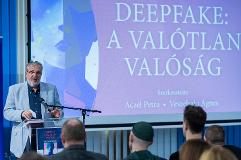 A könyvbemutatót Szadai Károly, a Médiatanács tagja nyitotta meg
A könyvbemutatót Szadai Károly, a Médiatanács tagja nyitotta meg
-
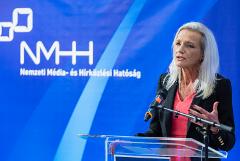 Aczél Petra professzor arról beszélt, hogy a deepfake az AI igen különös iránya
Aczél Petra professzor arról beszélt, hogy a deepfake az AI igen különös iránya
-
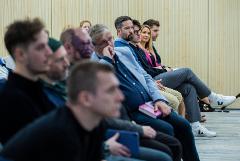 Az október 16-án megrendezett bemutató vendégei
Az október 16-án megrendezett bemutató vendégei
-
 A kötet szerzői: Keleti Arthur, Lendvai Gergely Ferenc, az NMHH jogi szakértője és Gocsál Ákos
A kötet szerzői: Keleti Arthur, Lendvai Gergely Ferenc, az NMHH jogi szakértője és Gocsál Ákos
-
 A szerzők rövid, de komplex kérdéseket kaptak, amelyekre egy-egy percben válaszolhattak.
A szerzők rövid, de komplex kérdéseket kaptak, amelyekre egy-egy percben válaszolhattak.
-
 Sokan kíváncsiak a Deepfake: A valótlan valóság című kötetetre
Sokan kíváncsiak a Deepfake: A valótlan valóság című kötetetre
-
 Aczél Petra és Veszelszki Ágnes a dedikálás után fotózkodtak is
Aczél Petra és Veszelszki Ágnes a dedikálás után fotózkodtak is
-
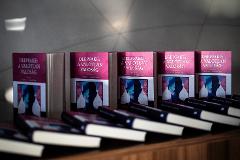 A Deepfake: A valótlan valóság című tanulmánykötet
A Deepfake: A valótlan valóság című tanulmánykötet